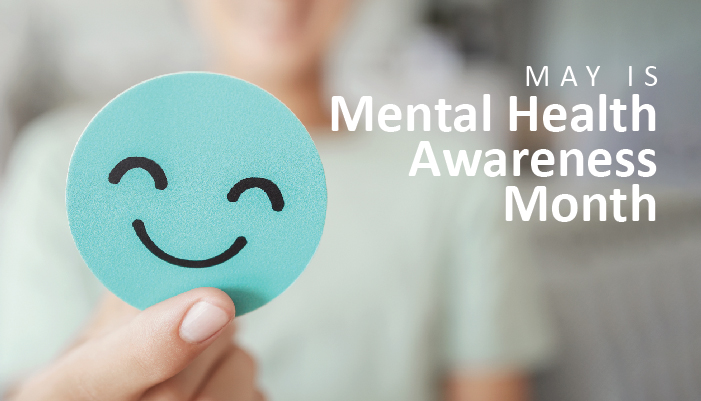
In recognition of May as Mental Health Awareness Month, we checked in with Jennifer Martinez MSW, LISW-S, Vice President of Behavioral Health Operations (Ohio), to understand the kinds of things we should be thinking about to spread awareness and support our own mental health. She also shared how our organizational approach to helping all people at Volunteers of America is designed to support mental health, too.
The theme* of Mental Health Awareness Month for 2023 is “Look Around, Look Within,” which aims to emphasize the ways that our surroundings – like safe and stable housing, healthy home lives, neighborhoods, cities, and nature – all impact our mental health.
No matter where you call home, it should give you feelings of safety, support, and connectedness to yourself and others. What you see around you every day can have a significant impact on your mental health. And living in an environment full of sound pollution can lead to feelings of stress, anxiety, and depression.
At Volunteers of America, we know that when people don’t have a safe and consistent space to call home, it can leave them feeling distressed and isolated. And this is especially true for people living with mental illness or a substance use disorder. That’s why, when someone comes into our care, we look at the whole person to address both urgent and on-going needs, including mental health status. We do this with the ultimate goal of helping people become as self-reliant as possible.
Taking a closer look at our services, our Family Focused Recovery program in central Ohio is slated to open later this year thanks to generous support from leading health and well-being company, Humana. The Family Focused Recovery program is modeled after our Fresh Start locations in Indiana. Our new facility in central Ohio will provide residential treatment and recovery support services for pregnant and postpartum women with substance use disorders, including opioid use disorder. Mothers will be allowed to have their children live with them while in treatment, which has been proven to increase success in recovery. The building itself is designed to be a welcoming and safe space where mothers can focus on their recovery journey while strengthening family bonds. The lights throughout the building are soft or dimmable to create a warm environment for families. And, the artwork and paint colors on each floor are specifically designed to uplift the mothers and children we serve.
This program follows a nationally recognized model that will focus on successful outcomes for mothers and their children. Volunteers of America Ohio & Indiana, with the support of Humana and other potential partners, will establish an enhanced payment model that will result in the reduction of high-cost neonatal intensive care unit (NICU) stays for babies born during their mother’s stay at the center; and ensure continual treatment for mothers in the program.
And while the environment the women live in supports positive mental health status, we also aim to provide counselling and connect them with other local programs and services that would be beneficial to their recovery journey. They learn things like, keeping things neat and surrounding yourself with soothing colors and patterns can have a positive impact on your mental health. While chaotic environments have the opposite impact. If noisy environments give you stress, using headphones or a speaker to play music, or your favorite podcast can help reduce those feelings.
Here are more ways you can cultivate positive mental health in your own life through simple mindfulness exercises to reduce stress and anxiety:
- Do a 1-minute mindfulness meditation. There are several videos and apps that will walk you though a 1-minute guided meditation. For those new to meditation this can be a great way to start, but even if you are experienced with meditation a 1-minute break to focus and reset can be very helpful.
- Color, draw, or doodle.
- Go for a walk. Fresh air and movement are two of the best ways to reduce stress and anxiety, bonus points if you leave your phone in your pocket, or better yet at home.
- Wish other people happiness.
- Acts of kindness, even small ones can improve the well-being of the giver and the receiver.
- Focus on one thing at a time.
- Multitasking is overrated, make a list of the most important things you need to accomplish each day and focus on them one at a time until complete.
- Step away from the screen!
- Do we really need to take our phones into the bathroom with us?
- Turn your phone off or put it away for an hour to decompress or try a social media free weekend.
- Turn your household tasks into quick mental health breaks.
- Feeling overwhelmed by dirty dishes, and unfinished laundry? Set a 15-minute timer and take care of some of those things. You’ll feel better and less distracted.
- Journaling. This can be anything from simply writing down the thoughts in your head, to sharing what you are grateful for, or the three best things that happened in a day, there is no right or wrong way!
- Embrace downtime. We can’t be mindful all the time, listening to music, reading a book, watching a movie, working in the garden, or taking a warm bath are all great ways to relax and let our minds wander.
*Mental Health America
